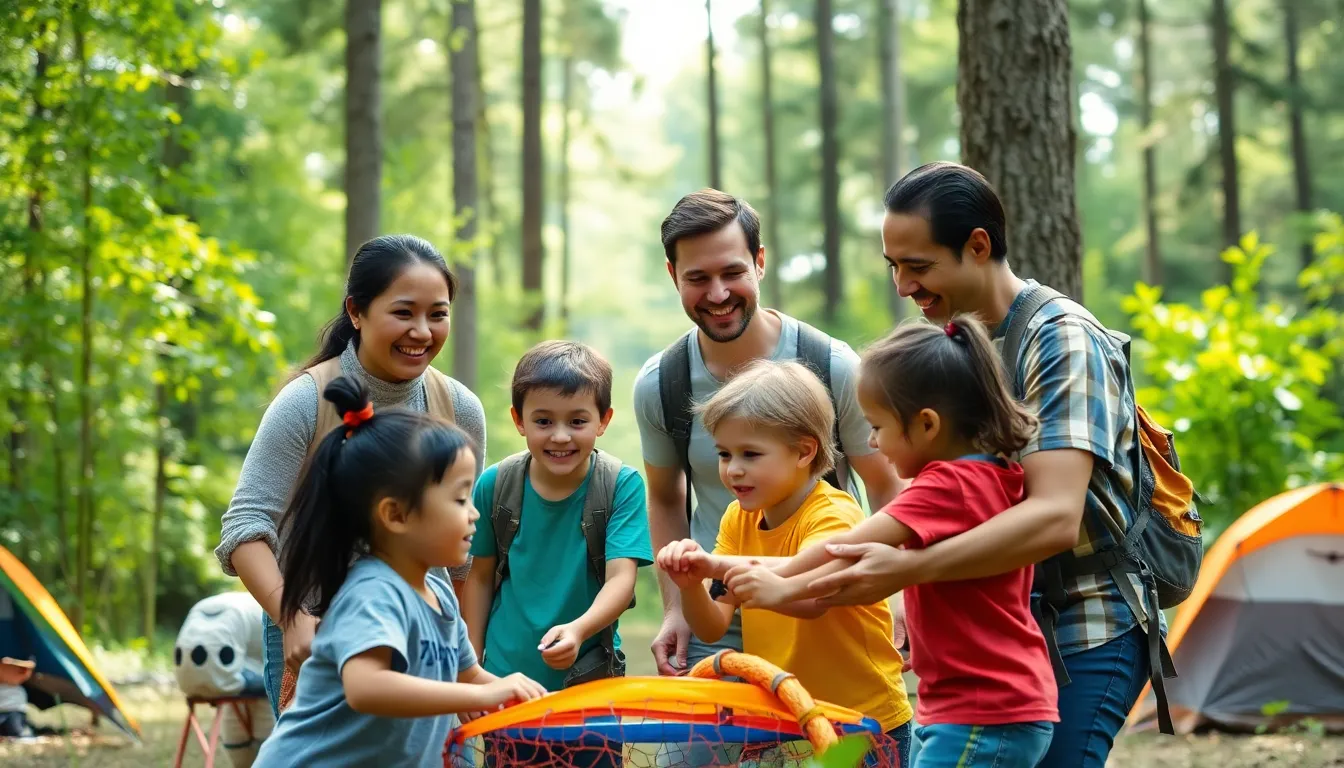Summer’s just around the corner, and that means it’s time to swap the screens for sunshine and adventure. Imagine a place where kids can unleash their inner wildlings while parents kick back and enjoy some well-deserved relaxation. Family summer camps offer just that—an escape from the ordinary and a chance to create unforgettable memories together.
Table of Contents
ToggleOverview of Family Summer Camps
Family summer camps offer an array of activities that promote bonding and adventurous experiences. Parents and children engage in various programs designed to strengthen relationships while exploring the outdoors. Each camp typically includes activities such as hiking, swimming, and arts and crafts, providing something for everyone.
Families can choose from day camps, where participants return home each evening, and overnight camps that create immersive experiences. Overnight camps foster independence in children while allowing families to connect in unique settings. Balanced programs cater to different age groups, ensuring children of all ages, from toddlers to teens, find activities suited for them.
Camps are often located in picturesque areas, such as mountains, forests, or lakesides, providing stunning backdrops for activities. Safety is a priority at these camps, with trained staff ensuring that children are well-supervised during all activities. Many camps also promote educational components, incorporating lessons in nature, sustainability, and teamwork.
Financial considerations play a key role in selecting a camp. Some facilities offer sliding scale fees or scholarships to accommodate various budgets, making camp accessible to more families. Researching camps can uncover unique offerings, including specialized programs for specific interests like sports or the arts.
Parents can discover local family summer camps through community resources, online reviews, and word of mouth from friends. Each experience at camp enriches family life, helping create unforgettable memories through adventure and connection. Families seeking to spend quality time together find summer camps an excellent choice for fostering relationships and creating lasting memories.
Benefits of Attending Family Summer Camps

Family summer camps offer numerous advantages for each family member. These camps provide a unique environment that fosters connection and enjoyment while creating lasting memories.
Bonding Opportunities
Shared activities enable families to strengthen their relationships. Engaging in group challenges or cooperative games makes it easier for parents and children to communicate openly. Families experience quality time away from everyday distractions, enhancing emotional connections. Campfire evenings provide a perfect chance for storytelling, creating laughter, and sharing experiences. Participating in team-building exercises encourages cooperation and mutual support among family members. These interactions lead to a deeper understanding of each other’s strengths and preferences. Overall, these bonding moments enrich family dynamics and contribute to long-lasting memories.
Skill Development
Attending family summer camps facilitates skill enhancement for all ages. Children learn new activities such as swimming, hiking, or crafts, boosting their self-confidence. Specialized workshops teach valuable skills, from outdoor survival to artistic expression. Parents can also explore new interests alongside their children, promoting lifelong learning. Challenging activities encourage both physical and emotional resilience, helping family members discover their capabilities. Camps often offer leadership opportunities, allowing children to take on responsibilities and collaborate with peers. Each participant returns home with enhanced skills and a sense of accomplishment, benefiting their lives beyond the summer experience.
Types of Family Summer Camps
Families can choose from various types of summer camps that suit their interests and preferences. Each camp type offers unique experiences and activities for all ages.
Adventure Camps
Adventure camps focus on outdoor activities that thrill and excite. Families explore hiking, canoeing, rock climbing, and zip-lining while enjoying nature’s beauty. Participants often work together in teams, promoting cooperation and bonding. Campers develop resilience and confidence through challenging physical activities. Such experiences help children and parents connect on deeper levels. Many adventure camps prioritize safety, employing trained staff to guide participants. Locations often feature scenic landscapes, enhancing the overall experience.
Educational Camps
Educational camps incorporate learning into fun activities that captivate curious minds. Families engage in STEM projects, nature studies, and various workshops to inspire creativity and critical thinking. Children can learn everything from coding to wildlife conservation while having fun. Parents often appreciate the combination of education and entertainment, enriching their children’s summer. Campers develop problem-solving skills and teamwork through interactive learning experiences. Educational camps emphasize hands-on activities, helping families apply new knowledge in exciting ways.
Arts and Crafts Camps
Arts and crafts camps nurture creativity through various artistic mediums. Families can participate in painting, pottery, woodworking, and other crafts during their stay. These camps encourage self-expression and imaginative thinking among participants. Children explore their artistic abilities while parents support and join in activities. Workshops often feature experienced instructors who guide students, ensuring a rewarding experience. Campers develop fine motor skills and learn about different art forms. Such environments foster collaboration and appreciation for creativity within families.
Factors to Consider When Choosing a Camp
Selecting the right family summer camp involves multiple factors that enhance the camping experience. Location, age suitability, and camp activities play significant roles in ensuring the camp aligns with family preferences.
Location Accessibility
Proximity to home significantly impacts convenience. Camps situated within a reasonable drive minimize travel time, allowing more energy for activities. Families can consider transportation options, such as public transit or carpooling, for added flexibility. Evaluating nearby amenities can also add convenience, making trips to grocery stores or medical facilities possible if needed. Checking for on-site parking ensures easy access for families arriving by car.
Age Suitability
Age-appropriate camps engage children and parents alike. Camps designed for specific age groups maximize enjoyment and safety through tailored activities. Younger children benefit from gentle guidance, while older kids appreciate challenges that foster independence. Many camps indicate suitable ages in their descriptions, helping families identify the best fit. It’s crucial to match the camp’s offerings with each child’s interests and maturity levels, enabling everyone to participate fully.
Camp Activities
Engaging activities create memorable experiences. Families should evaluate the variety of options available, including outdoor adventures, arts and crafts, and team-based games. Each day’s schedule typically showcases both structured and unstructured time, allowing families to bond during various activities. Camps offering specialized programs, such as STEM workshops or sports clinics, promote skill development while encouraging teamwork. Asking about the frequency of unique events can provide insight into how diverse and exciting the camp experience may be.
How to Find the Best Family Summer Camp Near Me
Finding the ideal family summer camp requires research and careful consideration. Parents can effectively use several strategies to identify camps that suit their family’s needs.
Online Resources
Utilizing online resources simplifies the search for local family summer camps. Websites such as CampFinder and ACA (American Camp Association) provide extensive listings of camps categorized by location, activities, and age suitability. Reviews on platforms like Yelp and Google also offer insights from other families, helping with informed decision-making. Social media groups often feature camp recommendations and experiences shared by fellow parents. Search engines can yield targeted results by typing in specific queries, ensuring families uncover all available options.
Community Recommendations
Community recommendations play a crucial role in selecting a family summer camp. Local schools and libraries frequently share information about nearby camps, making them valuable resources. Engaging with neighborhood parents can lead to personal experiences and insights about various camps. Attending community events or fairs may provide opportunities to meet camp representatives and ask questions directly. Word of mouth often leads to reliable suggestions that cater to different interests and preferences, ensuring families find camps that resonate with their values and expectations.
Choosing a family summer camp can transform the season into an unforgettable adventure. It offers a chance for families to step away from screens and immerse themselves in nature while strengthening bonds. With diverse options available there’s something for every family dynamic and interest.
Whether it’s an adventure camp or an arts and crafts retreat families can create lasting memories and develop new skills together. By utilizing community resources and online platforms families can find the perfect camp that fits their needs. Embracing the summer camp experience can lead to growth connection and joy for everyone involved.




